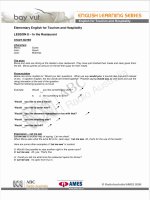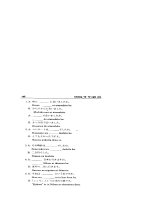4eSample poster 8 evaluation
Bạn đang xem bản rút gọn của tài liệu. Xem và tải ngay bản đầy đủ của tài liệu tại đây (19.14 KB, 1 trang )
Offspring Development Mode and the Evolution of Brood Parasitism
the thorny case of Coccyzus cuckoos
Dearborn, MacDade, Robinson, Fink, and Fink
Presented at the biennial meeting of the International Society for Behavioral Ecology
at Cornell University in August, 2008 1
Layout and Appearance
Criteria
APPEARANCE: Is the poster neatly
constructed? Do the text and the figures
stand out against the background? Are
colors and fonts used consistently? Is the
text large and legible from 3–6 feet away?
SECTIONS: Does each section begin with a
descriptive heading? Is there sufficient
space between sections? Do the sections
naturally flow from top left to bottom right?
BALANCE: Is there a nice balance between
text and figures? Is there too much text?
PROOFREADING: Is the text free of typos
and grammatical errors?
Positive
Negative
®
Poster made with PowerPoint looks
professionally done.
Text and figures stand out against the
background.
Font is large and legible.
Non-traditional box headings are
effective.
Flow of sections is assisted by
numbered boxes.
Good balance between text and
figures.
No apparent typos.
Content
Criteria
Positive
Negative
TITLE: Does the title grab your attention?
AUTHORS: Are the authors’ names,
affiliations, and contact information
provided?
INTRODUCTION: Were the objectives
clearly stated? Do you understand why this
study was done? Did you get enough
background information to understand the
system? Were any abbreviations defined for
the general visitor? Were the hypotheses
rational?
METHODS: Were the methods described
clearly and concisely?
RESULTS: Were the graphs easy to
understand? Were any graphics distracting?
CONCLUSIONS: Do the conclusions match
the data? Are reasonable ideas put forth to
explain the observed patterns? Is there a
clear connection between the conclusions
and the original objectives?
Authors and affiliations are
provided.
Abstract helps viewers determine
whether they are interested in the work.
Technical terms are explained in Box
2 background (altricial versus precocial
offspring).
Objectives are clearly stated in Box 3
background.
Results focus on the question, with
the answer immediately following.
Graphs and images support the answer.
Conclusions are given in Box 7.
There is a clear connection between the
conclusions and the original objectives.
References support statements made
in the background boxes.
Acknowledgments are given.
Title does
not hint at the
results. 2
1
This work was subsequently published in this society’s journal. Dearborn D. C., MacDade L. S., Robinson S., Fink
A. D. D., and Fink, M. L. 2009. Offspring development mode and the evolution of brood parasitism. Behavioral
Ecology 20:517–524.
2
The first author comments that the main result could be perceived as uninteresting (“These cuckoos are NOT the
brood parasites that we thought they were; rather, they reproduce parentally like 99% of bird species.”).









